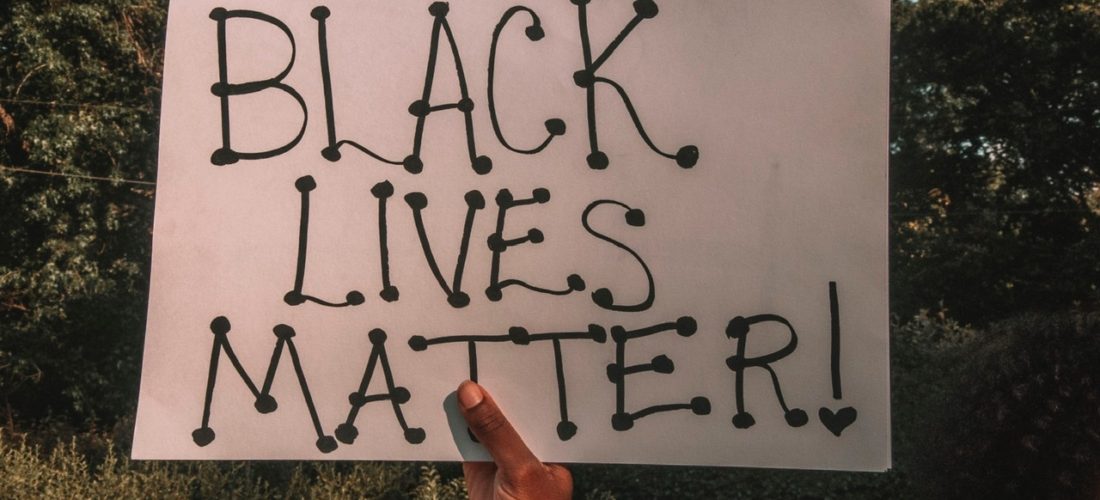My Dear Mormon Community,
I’ve been trying to write this letter for days. Trying to find the right words, the right tone, and the right way to phrase things isn’t an easy task. Nothing seems adequate and if I’m being really honest with myself, I’m not sure the ones who need to read this actually will. You see, I’m your resident post-Mormon—the one who left—so it’s easy for believing members to discount anything critical I say about the church. I’ve been called angry, bitter, unreasonable, and mentally ill for my decision to step away. It’s okay, I get it. So please, hear me out for a bit. Listen before you decide I’m full of it. You can always go back to thinking I’m wrong after you’ve read my letter.
These last few weeks have been really intense, and we all know why; the news and the protests, the memes and articles passing around on social media. We’re rubbing up close to our friends and family’s political leanings that we may or may not exactly share. These weeks are a page in our history books that our grandchildren will one day read. Except, right now there’s a dividing line and it’s stark: either you support the protests and change brought about by George Floyd’s murder, or, well…you don’t.
This week I took the opportunity to “mute” or “unfriend” everyone who falls in the “don’t” category. Normally I believe in surrounding myself with people who hold different views, if for no other reason than it challenges me to research and confront my own ideas. But on this issue, I draw the line because I cannot tolerate the tolerance of the intolerable. This is too much and I’m frustrated at the lack of listening in these social media spaces.
I wasn’t surprised by who I was “muting” and “unfriending.” No one who I unfriended made me sit back and say, “Oh my gosh, really? She thinks that way?” Usually the only thing escaping my lips was a long sigh or a mumbled, “Of course.” As I reflected on this division between the “supporters” and the “non-supporters,” I realized a common factor: I wasn’t “unfriending” people from a particular political party, I was “unfriending” my Mormon community. The ones exhibiting the worst behavior on social media were my dear Mormons. This wasn’t one or two instances or people, but a one-after-the-other kind of a deal.
I tried my best to explain with love and patience, to back up my reasoning with facts and figures, to show what was happening by pointing to Black voices and experiences. The Black community has been trying to explain their frustration and pain for a very, very long time. Each time I tried to engage with another Mormon about this issue, I was dismissed. I get it, you don’t want to hear what this post-Mormon is saying. However, I had hoped you would listen to what others are saying and not disregard my words because we disagree on the church. I thought, perhaps, you could at least acknowledge the issues and problems, the hurt and pain.
Within the church, outsiders aren’t really listened to; I was born and raised in this religion and lived a decade of my adult life as a faithful member. During my time in the church, I had a very real sense of “us vs. them” with the “them” being non-members. I was taught again and again that God loves me when I pray the Mormon way, when I dress the Mormon way, and when I act the Mormon way. Those things didn’t just mean God was pleased with me, it meant I was better than anyone who didn’t follow the Mormon way. God loved me more because I was Mormon.
I can already hear you saying, “You’re wrong! We don’t teach that, we don’t say that. We love everyone just as God loves everyone.”
My response to that is to think about the last time you heard someone in the church say, “He’s not a member, but he’s still a good person.” I personally heard that just two days ago. Being a church-going Mormon is an automatic qualifier of goodness. If being a member didn’t matter to someone’s goodness, then we wouldn’t automatically trust the Mormon salesman, the Mormon doctor, or the Mormon politician. How many authors are on the bookshelves of Deseret Book for no other reason than they’re Mormon? I’ve seen Stephanie Meyer’s Twilight being sold at Deseret Books as well as Orson Scott Card’s Ender’s Game. Those aren’t Mormon books, but they’re written by Mormons.
So, again, the question always comes back to this: are they a member? If not, that’s okay because they can still be good.
My dear Mormons, that’s a problem. By setting up this “us vs. the other” type of thinking, we’re too quick to discount what other’s have to say. If it doesn’t come from the church, then it must be wrong, not as correct, not as worthy, or not as good.
Again, I can hear you say, “You’re wrong! We have NEVER said that.”
Then let me present you this:
Of the remaining Mormons on my Facebook feed, almost all of them have shared President Nelson’s statement that was co-written with the NAACP. The church has done the bare minimum by putting out a statement against racism that Mormons can hold up. Mormons can now point to that and say “See? We’re not racist. We’re not the problem!”
Now, how many of those same Mormons posted the Salt Lake Tribune’s article, “Despite joining President Nelson in call to end racism, NAACP would like to see the LDS Church do more”?
Not many.
More specifically, this an excerpt from that article:
Indeed, the two organizations have collaborated on a handful of employment and education initiatives. But those were “minor efforts,” Colom [who is authorized to speak on behalf of the NAACP] said. They “do not befit the stature and magnitude of what the LDS Church can do and should do.”
The NAACP is “looking forward to the church doing more to undo the 150 years of damage they did by how they treated African Americans in the church,” Colom said, and by their “endorsement of how African Americans were treated throughout the country, including segregation and Jim Crow laws.”
Which one are you more ready to say is wrong? Which one do you automatically support? Which one are you more willing to believe about history and the issues of systemic racism? Which one will you discount first: the church or the NAACP?
If you’re ready stand up and say, “The church doesn’t have a history in racism!” then I’m sorry to inform you otherwise.
The church didn’t just ban black men from holding the priesthood until 1978. The ban meant black families couldn’t be sealed together in the temple. Black men and women couldn’t receive their endowments; those saving ordinances that are essential for one to get into the highest kingdom of Heaven. Also, by not being able to hold the priesthood, Black men couldn’t hold any leadership positions in the church. They couldn’t be bishops, branch presidents, quorum leaders, counselors, or even pass the sacrament.
And what about Jane Manning James? She was a Black woman pioneer who petitioned the first presidency to be sealed to Joseph Smith based on promises that were made before his death. In 1894, she was eventually sealed to him—but as a servant and not as a child (which is what she had been promised by Emma Smith). She wasn’t even allowed in the temple for her sealing, but someone had to stand in as a proxy while she waited outside. She tried, again, to petition to be sealed to Joseph Smith as an adopted child, but her request was denied. I haven’t found an instance or record in which it has been rectified.
Additionally, Mark E. Petersen (an apostle of the church) said in 1954, “If that Negro is faithful all of his days, he can and will enter the Celestial Kingdom. He will go there as a servant, but he will get a Celestial resurrection.” The idea that Blacks were less superior and valiant within the church went far beyond the Civil War and all the way up until the priesthood ban was lifted—almost a decade after the Civil Rights Movement.
Regarding the Civil Rights Movement, Ezra Taft Benson said the it was a tool of communism during the October 1967 General Conference. The next year, Deseret Book republished the talk as a pamphlet titled: “Civil Rights: Tools of Communist Deception.”
“But that’s all in the past,” I can hear you say. “They were speaking as men of their time. That doesn’t reflect the church’s current position. Look at what the church is doing now!”
First, things that happened a long time ago can still affect current day thoughts and practices. It sets a precedent for people to follow and if we’re not good at recognizing harmful thoughts and ideas, they continue to be perpetuated.
Second, we are all men and women of our time. Just because it was acceptable years ago, doesn’t make it right. What it does is give us an explanation for why nothing more was done about it at the time or why it was allowed to continue for so long. Harriet Tubman was a woman of her time. She was born around 1820 and grew up in the same years that Joseph Smith was establishing Mormonism. She also claimed to have visions from God and was deeply spiritual. Why was God telling her to be an abolitionist and helping her free slaves while telling Brigham Young to support slavery at the same time?
Third, the church talks a lot about it’s history. Every four years we have another lesson manual for us to follow all about the founding of the church through early pioneer life in Utah. I’ve been taught again and again about the Hawn’s Mill Massacre and how the Mormons were driven from Missouri and Illinois. I’ve sat through many pageants centered around Joseph Smith and Brigham Young and the Utah Territory. You can’t even graduate from BYU without passing at least one church history class! We talk about our history and heritage all the time. Why is it okay to talk about the Mormon Extermination Order but not about how the church didn’t oppose eternal servitude? Why can’t we talk about the priesthood ban and the implications of that within our Mormon community? These things are also part of our history and they should be discussed. Discussing issues within our community shouldn’t stop us because it’s uncomfortable. That’s how we learn and grow and better understand others.
Lastly, I am looking at what the church is doing now and I am not seeing much. The church still hasn’t formally shown contrition for it’s racist past. I’d always been taught that the first steps towards repentance and forgiveness is to recognize your wrongdoing and apologize. The church has done what it can to disavow and distance itself from its racist past and teachings, but I haven’t seen or heard an apology. Disavowing and distancing isn’t the same as recognizing and repenting. If someone stole something from you and years later you confront them about it, and their reaction is “But I don’t do that anymore. Stop talking about it.” you wouldn’t feel heard or validated or understood. You would feel dismissed because the conversation over the wrongness of the act and the ways to make it right hasn’t been had.
So that is why I look to the individual members. The leadership of this church seems unwilling to apologize. Change can either come from the top and trickle down, or the bottom can demand change from those above them. If the leaders of the church won’t do more, then the members must.
A handful of Mormons have raised their voices in support of Black Lives Matters, but those are “fringe” Mormons. I call them “fringe” because they’re not exactly mainstream. Either their belief in the church is nuanced enough that I won’t be surprised if they leave in the next year or so, or they have children in the LGBTQAI+ community and have had a front row seat to their children’s pain. They have to be nuanced in order to fully accept their children and be faithful members of the church. The one Mormon friend who is a true-believing member and supports BLM happens to be a BIPOC (Black, Indigenous Person Of Color) themselves. These aren’t your typical, Utah-bred Mormons.
When this handful of Mormons speak up by pointing out problems and presenting solutions, the ones pushing against them the most is other Mormons. The ones most unwilling to engage in understanding and discussion are church going, scripture reading, General-Conference-listening, I-pray-daily Mormons. Most heartbreakingly is when the BIPOC Mormon tried to share their experiences and advice, a member from their ward told them to stop talking because they were “tired of hearing about this.” This was the first time I’d ever seen this person talk about their experience and they were readily shut down because a white member of their ward was “uncomfortable.”
My Mormons, it shouldn’t be this way!
When Christ taught about the Good Samaritan, it wasn’t just a lesson about serving others. It was about overcoming biases that have been passed down generation after generation. The Samaritans weren’t liked or respected during Christ’s time.
When Christ taught about the shepherd who left the 99 to go after the one, it was because the one was hurt and needed help. I don’t recall the 99 saying “What about me? Don’t I matter as well?”
When Christ was asked to judge the woman caught in adultery and he said, “Ye without sin, cast the first stone,” it was about understanding another’s pain and life. My favorite part of that story is what came after, when Christ brought the woman to her feet and didn’t condemn her. He saw right through to her heart and embraced her. He heard her pain and sorrow.
I want this church to be more Christ-centered. I could almost—almost—excuse it’s past misdeeds if I felt it was making a better effort to own up to it’s mistakes and continue on with a more charitable, progressive stance. Instead, I see the leadership do the bare minimum and the members follow their example by do even less. Again and again, I’ve seen believing members dismiss the protesters because of the violence, yet I’m not sure I’ve ever seen them listen in the first place. Colin Keapernick taking a knee was “too unpatriotic.” Black Lives Matter was “too exclusive.” There have been calls for peace, but do you want peace or do you want silence? Because, every time the issue is brought up, you shrug your shoulders, roll your eyes, and say, “Not again.”
I can’t stay silent anymore and I can’t ignore the anguish of the Black community. I can’t tell them to “tone it down” because they’ve been telling us for a very long time about the injustices they deal with every single day. I can’t look at the issue and say, “I’m not the problem, this doesn’t apply to me,” because it does apply to me. I live in this world, I teach the next generation, and I vote every chance I get. We don’t function in our own little bubble; our lives are interconnected.
My dear Mormons, I expect more from you. I want you to surprise me. I want you to sit down and listen. I want you to learn and grow. I want you to educate yourself on these matters, to pick up a book and learn the history of racial injustices that came after the Civil War and not just in the context of Martin Luther King’s “I Have A Dream” speech. I want you, just for a moment, to step outside of yourself and consider how someone else might feel and experience life. Maybe, just maybe, you’d be out there protesting, too.
If you want to read more about racism, then let me recommend the book White Fragility. You can do the research for yourself and still come away thinking I’m full of crap. We’ll never know if you don’t do the work.
Your resident post-Mormon,
September Marden



